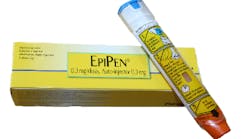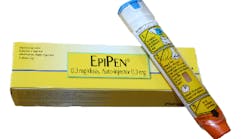An alternative to the EpiPen for the dental office and home that can save you hundreds of dollars
Editor’s note: EpiPen, an epinephrine auto-injector manufactured by the drug company Mylan, has recently seen a substantial price increase that caused a national outcry. Once sold for $57 in 2007, the price for an EpiPen has skyrocketed to more than $500 today, with an average store selling it for $615. In fact, since 2009, this product has had six different price increases. Lawmakers have gotten involved and put pressure on the company to distribute a coupon that will decrease the cost for the retail shopper by a couple hundred dollars. This discount, however, still results in a substantial cost in the hundreds of dollars to purchase an EpiPen.
George Felt, DDS, a periodontist practicing in Meredith, New Hampshire, provides us with this month’s clinical tip on how to protect yourself, your family, and your patients from allergic reactions and anaphylaxis without having to pay such an expensive price. — Scott Froum, DDS, editorial director of Perio-Implant Advisory
The recently increased cost of the EpiPen triggered a search for alternatives, and I am pleased to report that there is a viable alternative product available for anyone in the health profession who is willing to invest a few minutes in getting up to speed with the system.
This product is the LifeShield Glass Abboject Unit of Use Syringe, which offers 10 ml of epinephrine for injection. The glass vial contains 1 mg of epi in 10 ml of sterile water (epinephrine 1:10,000 1 mg 0.1 mg/ml). You simply need to load it into the injector and put a needle on the end of the syringe. Use a 20- or 21-gauge one-inch needle with a Leur-Lok adapter (order these separately). These items can be obtained from various supply houses at a fraction of the cost of an EpiPen; I paid $12 plus the cost of a box of needles.
I suggest that you order three or four of these and practice with a couple of them, so you are not starting from scratch in an emergency when time is of the essence. See an example of setup in this video:
According to James G. Wilson, DMD, a periodontist from Florida, another way to prepare for urgent care is to preload a 1 ml syringe with the desired amount of 1:1000 epinephrine that you draw up from an ampule. Ampules of 1:1000 epinephrine are available from many suppliers for about $5. Place a one-inch 21- or 23-gauge needle on the 1 ml disposable syringe, open the ampule, and draw up 0.3 ml. Replace the cap on the needle and set the now-preloaded syringe aside, being sure to label it and keep it in a place away from heat, light, or dampness. Dr. Wilson said he uses an eyeglasses case. You can do the same thing two more times with that open ampule; now you have three preloaded epi delivery systems that are ready to go at a moment’s notice.
Please note the “born on” or expiration date on these systems, as they should be replaced at two- or three-month intervals (depending on storage conditions). At these prices, you can replace them every two months and still come out way ahead of what you used to spend on the EpiPen. Timely delivery of epinephrine is one of the most effective ways to manage an anaphylactic event. With either of these approaches you can do it as well as anyone.


